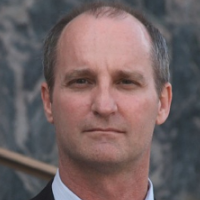Meet California Lawmakers’ Favorite Marijuana Dealer
 Charles Lynch
Charles Lynch
Unemployed former marijuana dealer Charles C. Lynch, 52, lives in a trailer behind his parents’ home in Bloomfield, New Mexico, hundreds of miles away from the California politicians who are fighting to keep him out of prison.
Lynch was prosecuted by the U.S. Attorneys Office and convicted in 2008 of breaking federal drug laws, two years after the Morro Bay mayor, the city attorney and Chamber of Commerce leaders attended the grand opening of the former software businessman’s medical marijuana dispensary.
The state did not have a legal objection, but the U.S. Department of Justice (DOJ) did. Lynch was one of the first federal prosecutions after California legalized collectives and cooperatives in 2006.
The federal trial judge did not allow the mention of “medical marijuana” and Lynch could not claim the protection of state law. He ended up with a sentence of one year and one day in prison. Lynch appealed and as the case awaits a hearing before the U.S. Ninth Circuit Court of Appeals, two congressmen from California, two state senators and a former state Senate leader have weighed in on his behalf.
Congressmen Dana Rohrabacher (R-Costa Mesa) and Sam Farr (D-Carmel) filed an amicus brief (pdf) with the court as it tries to sort out the meaning of a measure they co-authored last year, which bars the feds from spending a dime to prevent states from “implementing their own state laws that authorize the use, distribution, possession or cultivation of medical marijuana.”
The measure, Section 538, was one tiny part of the omnibus budget appropriations bill signed into law last December. Rohrabacher and Farr say its intent is clear. The U.S. Attorneys in California should stop aggressively busting dispensaries that are sanctioned by local and state laws.
“Despite Congress’s mandate that the DOJ permit states like California to implement and enforce their own state laws without interference by the federal government, the DOJ continues to spend federal funds unlawfully prosecuting this case and others like it, in violation of Section 538.”
Others say otherwise. Douglas Berman, a law professor at Ohio State University and editor of the Marijuana Law, Policy and Reform blog, told the Los Angeles Times the law was “pregnant with uncertainty.”
The DOJ says the law doesn’t apply to their chasing after bad guys. It only forbids them from messing around with states as they execute their marijuana laws. Rohrabacher/Farr said that interpretation is “emphatically wrong” and that prosecutions have to stop.
Lynch’s attorneys tried to make that pitch to a three-judge panel of the circuit court, but were told the issue would not be considered while their client was waiting for a hearing on his conviction. That may not be until next year. So they asked for the full court to hear the issue now and the lawmakers unexpectedly joined in.
Thirty-six states and the U.S. District of Columbia have enacted some form of marijuana legislation that doesn’t jibe with federal law. President Obama and former Attorney General Eric Holder have given conflicting messages about federal policy—the President said he had “bigger fish to fry”—but they did not constrain DOJ prosecutors, especially in California.
Rohrabacher and Farr had some sharp words for the prosecutor’s “feigned confusion over the meaning of Section 538 and its patently absurd interpretation of the prohibition on the expenditure of federal funds.”
A second brief (pdf), which echoed many arguments in the first, was filed by Democratic state Senators Mark Leno and Mike McGuire, and Former state Senate Pro Tem Darrell Steinberg. It points out that the DOJ “has never challenged California’s medical marijuana laws in court” but “opposes allowing federal criminal defendants the ability to assert compliance with state law as a defense.”
The New York Times said last month that federal prosecutions of dispensaries the states have dramatically declined the past two years but that the DOJ have become bulldogs on existing cases, like Lynch.
When U.S. District Judge George H. Wu sentenced Lynch in 2008, he cut the DOJ’s request for five years down to one and lamented that “individuals such as Lynch are caught in the middle of the shifting positions of government authorities.”
The prosecutors took the judge’s words to heart and asked the appellate court for the five-year sentence and that Judge Wu be removed from any further proceedings.
–Ken Broder
To Learn More:
Convicted Medical Pot Seller Finds Congressional Allies in Legal Appeal (by Joel Rubin, Los Angeles Times)
Legal Conflicts on Medical Marijuana Ensnare Hundreds as Courts Debate a New Provision (by Erik Eckholm, New York Times)
Medical Marijuana Test Case Pits U.S. Attorney Against Holder’s Stated Policy (by Noel Brinkerhoff, AllGov)
Rohrabacher-Farr Amicus Brief (U.S. Ninth Circuit Court of Appeals) (pdf)
Leno-McGuire-Steinberg Amicus Brief (U.S. Ninth Circuit Court of Appeals) (pdf)
- Top Stories
- Controversies
- Where is the Money Going?
- California and the Nation
- Appointments and Resignations
- Unusual News
- Latest News
- California Forbids U.S. Immigration Agents from Pretending to be Police
- California Lawmakers Urged to Strip “Self-Dealing” Tax Board of Its Duties
- Big Oil’s Grip on California
- Santa Cruz Police See Homeland Security Betrayal in Use of Gang Roundup as Cover for Immigration Raid
- Oil Companies Face Deadline to Stop Polluting California Groundwater





